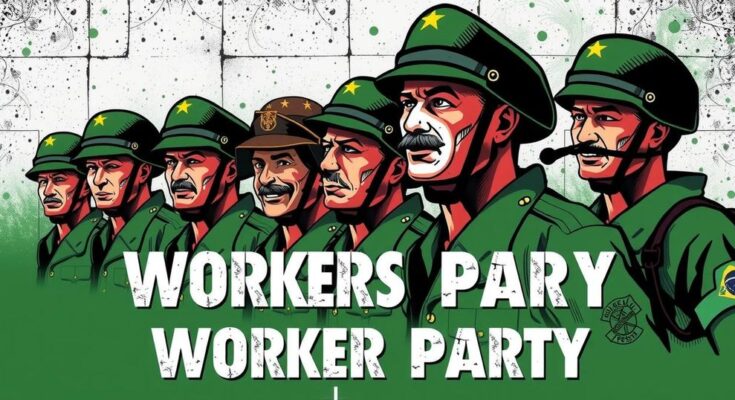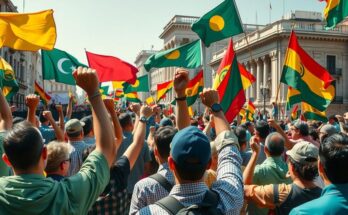On the second anniversary of the January 8th coup attempt, the Brazilian Workers Party’s commemorative event revealed ongoing political cowardice and reactionary alignment with military forces. Lula sought to legitimize this alignment under a guise of nationalism, neglecting the working class’s critical historical role and inciting concerns of rising authoritarianism fueled by international imperialist influences. To counteract these threats, emphasis on genuine socialist revolution is paramount.
On January 8, 2023, Brazil commemorated the second anniversary of the attempted coup ped by former president Jair Bolsonaro and elements within the military. Significant revelations regarding military collaboration in the coup have emerged, revealing deeper conspiratorial elements than previously acknowledged. In response, the Workers Party (PT) hosted a commemorative event, inviting high-ranking military officials only to further entrench its political cowardice and reactionary stance, epitomized by President Lula’s conciliatory rhetoric towards the military establishment.
Lula’s remarks aimed to unite rather than address Brazil’s high social disparities under a veil of nationalism. His invocation of ‘national unity’ recalls the language of the 1964 military coup, meant to uphold a regime that historically suppressed dissent through severe measures. By cozying up to the military implicated in the coup conspiracy, Lula attempted to obscure Brazil’s acute political crises while presenting the armed forces as protectors of democracy. Contradictory to this narrative, the military’s active involvement in discussions on installing a dictatorship dispels any legitimacy of their role as champions of democratic values.
Disparagingly, Lula glossed over his administration’s struggles and the working class’s vital historical role in democratic movements, instead championing a hollow concept of democracy that ultimately serves the interests of the ruling elite. His criticism of past revolutions, framing them as devoid of true worker representation, signals a denial of the fundamental role played by the working class in historical progress.
Moreover, at the event, Alexandre de Moraes, a Supreme Court justice, irresponsibly attributed the failed coup to internet freedom, advocating for increased censorship. This positions the state against the public, reminiscent of oppressive regimes rather than true democratic governance. Lula’s framing of democracy contrasts sharply with the political realities, asserting a simplistic dichotomy without acknowledging the complex socio-political landscape.
Internationally, the revival of Donald Trump’s influence, a key ally of Bolsonaro, poses significant risks, with Bolsonaro being invited to the U.S. presidential inauguration. The interplay between U.S. imperialist ambitions and the Brazilian political landscape heightens the call for vigilance against fascist resurgence. This moment presents an urgent need for authentic revolutionary sentiment rooted in worker empowerment and international solidarity to truly resist sponsored autocracy and oppression.
In summary, the commemorative observance of the coup attempt on its second anniversary illustrates the ongoing class struggles exacerbated by government complicity and historical amnesia. To avert the looming threat of authoritarianism, it is imperative for the Brazilian working class to rally towards a cohesive strategy fostering genuine revolution, aligning with global movements advocating for socialism.
The article centers around the second anniversary of the January 8 coup attempt in Brazil, revealing the complexities of political suppression and the role of the military and government in fostering social unrest. It discusses the Workers Party’s (PT) reactions, presenting a defense of nationalist military principles at the expense of addressing the socio-economic concerns that fueled the coup. The historical implications of Lula’s statements and the broader international context, particularly relating to U.S. politics and its influence on Brazilian affairs, provide essential insight into the contemporary struggles faced in Brazil.
The analysis of the second anniversary of the attempted coup in Brazil underscores the precariousness of democracy within the nation. It identifies the problematic intertwining of military power and governmental authority as a threat to the working class. Acknowledging the historical contributions of revolutionary movements, it becomes critical for the working class to initiate a movement toward genuine socialism, actively combating imperialist and fascist encroachments on liberation.
Original Source: www.wsws.org




